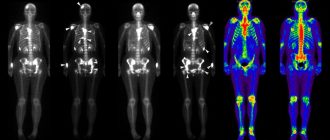PSA analysis for prostatitis is not the main diagnostic method for a number of reasons. However, it will help determine the transition of inflammation to a chronic form or the onset of an oncological process. For accuracy, a preparatory period of 3 weeks before the examination is indicated.
The interpretation of the results is not sufficiently accurate to make a diagnosis, however, it helps to determine the general condition of the organ and further changes in its functioning.
Reasons for increased PSA
Prostate PSA is a protein antigen produced by prostate tissue. Normally found in ejaculate, a small amount may enter the blood. When the prostate gland grows with age, inflammation or cancer occurs, more substances may enter the blood.
Indications for PSA testing
With prostatitis, the PSA marker increases slightly, so the method is considered uninformative and is prescribed to identify other possible pathologies.
The main indications for testing blood for PSA of the prostate gland are suspicion of adenoma or cancer. The antigen enters the blood in large quantities only when the prostate tissue malfunctions and grows, and with prostatitis this does not happen so clearly.
Analysis of prostate specific antigen can help to suspect the presence of cancer or BPH in the initial forms, but does not make an accurate diagnosis. If the level of prostate-specific antigen in the blood is elevated, additional examinations are prescribed. Against the background of inflammatory processes in prostatitis, a false positive result is also often observed. If the antigen increases by 20% of the norm, a repeat test is prescribed after 3-4 months.
It is recommended to undergo a blood test for prostate specific antigen if:
- pain in the groin area;
- difficulty urinating, frequent urge, pain and burning during the process;
- erectile dysfunction, weakened orgasm;
- pain during sexual intercourse.
Contraindications
A PSA blood test has no contraindications, but can give a false result, which will lead to improper treatment and increased patient anxiety. Therefore, a preparatory period occurs within 2-3 weeks, during which there are restrictions on various factors leading to deliberately false results.
Preparing for a PSA test
Restrictions include the following measures:
- 3 weeks before the test, stop taking medications that affect testosterone levels or improve potency.
- Stop procedures affecting the organ (palpation, TRUS, prostate massage) 2 weeks in advance.
- If there is a catheter in the bladder, it is necessary to undergo a procedure for its removal 2 weeks before the examination.
- 2 days before the analysis, follow a dietary diet, avoid fried, spicy and smoked foods, and do not drink alcohol or coffee.
- Refrain from sexual contact 3 days before the examination.
- Avoid physical activity, especially cycling and horse riding, for 2 days.
- Quit smoking the day before the test. If the addiction is too strong, withdrawal is necessary at least 2 hours in advance.
- 10 hours before donating blood, refrain from eating any food or drinks, except for a small amount of still water.
Also, when treating chronic prostatitis, you should consult with your doctor about temporarily stopping therapy 2 weeks before donating blood, because some drugs can affect the reliability of the result.
PSA test
The analysis is carried out in any hospital that has a laboratory for studying blood. The collection of material for analysis is usually scheduled for the morning, because the indicator has slight daily fluctuations.
The patient is placed in a sitting position, but if he has increased anxiety or dizziness, he is placed in a lying position. For the examination, a small volume of blood is taken from a vein, usually 5 to 10 ml. The results are deciphered and ready the next day. A PSA test is not a universal diagnostic procedure and only helps to confirm or refute suspicions of adenoma and cancer, but is rarely performed for prostatitis.
Doctors recommend taking an analysis of prostate secretions, which allows you to obtain more detailed information about the dysfunction of the organ.
Interpretation of PSA results
Deciphering the PSA analysis of the prostate gland is not difficult. The PSA limit for prostatitis is up to 10 ng/ml.
For people under 40 years of age, the normal result is 2 ng/ml. It increases with age, up to 50 years – 3.5 ng/ml, for 60 – 4-5 ng/ml.
The PSA value of the prostate during exacerbation of prostatitis increases sharply (up to 8-9 ng/ml), but does not go beyond the limit value. Some time after the end of therapy, the test is taken again; there should be a noticeable decrease to normal values. The absence or slight decrease may indicate the transition of the disease to a chronic form, the presence of adenoma or prostate cancer. The PSA level in chronic prostatitis is 5-7 ng/ml.
However, high PSA in prostatitis is not the main indicator in this analysis. For a more accurate diagnosis, the ratio of free antigen to total is compared; a figure of 15% is considered normal. In oncological processes, the level of free PSA decreases, but in chronic prostatitis it increases above normal.
With regular testing for prostate-specific antigen, you can also compare the dynamics of its increase or decrease, which will give a clear idea of the effectiveness of therapy or the progress of pathology. Normally, the antigen increases by no more than 0.75 ng/ml per year. Values above will indicate the development of an oncological process or an acute outbreak of prostatitis.
For the normal functioning of the prostate gland, it is recommended to follow simple rules that will help reduce PSA and improve the condition of the organ.



